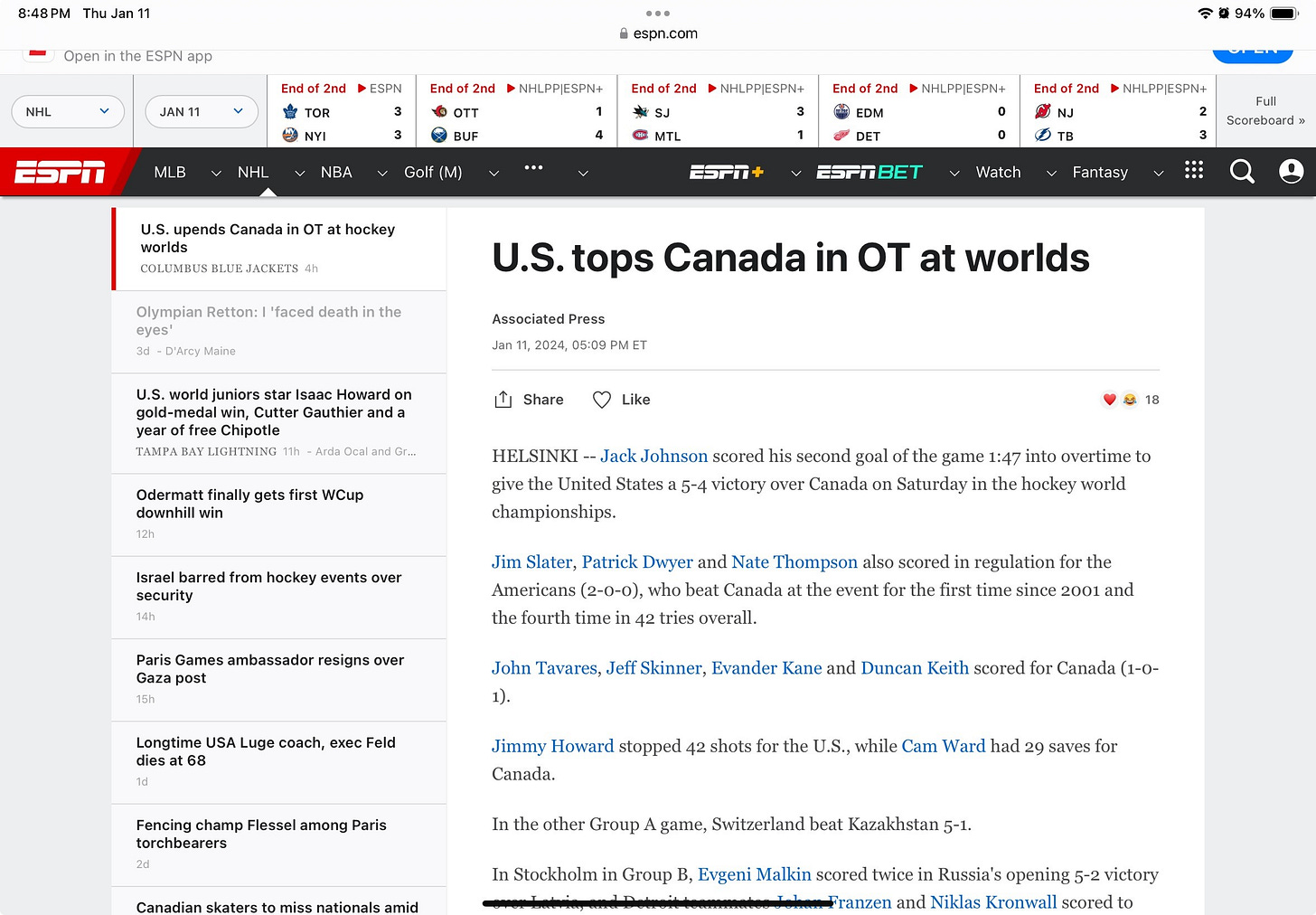Media and especially news is sooooo derivative these days. Everyone covers the same stories in mostly the same ways. So, reporters have, with increased frequency, started tossing SCOOP (yes, all caps) before their lede. Moments later, dozens of reports play parrot. We all get very bored and move on. Hence, “Scoop.” These days, being first is better than being best. How can you beat FIRST? Well…
— — —
My friend Brian sent me a text this AM with this picture.
On the surface, it looks like any other story. An Associated Press (AP) story on ESPN. The most unusual thing is that the US beat Canada in OT at the World Hockey Championships in Helsinki on Saturday.
It has a date. A place. A story. It links to the players who scored goals. You’ve seen thousands of stories like this one. Ho meet hum.
Except…
The players weren’t playing in Helsinki. They were playing in various cities in the US and Canada. There was no tournament. There was no game. And, now, there’s no story. ESPN took it down.
Maybe this was a mistake.An unidentifiable faux object. Just some reporter at the AP having fun. An unidentifiable faux object. Who just happened to upload an impossible and made-up story to the world’s biggest story service, tag it with hockey, and hit go. Where it was picked up by ESPN, and, perhaps, others. And posted. Then, someone at AP or ESPN noticed it and said, “Oops. Better take that down. It’s a mistake.”
I’ve seen mistakes. There’s not enough money for media to pay for copyediting. Typos abound. Data errors. Retractions. Redactions. Stories get pulled down. I’ve seen entire paragraphs duped in stories on the front page of the Globe & Mail. In print. Stuff happens.
But what if: this wasn’t a mistake? What if we saw a test? AP using AI to write stories. AP testing to see if an AI could create links and run the process all the way through distribution? And, what if the AI hallucinated?
As news becomes a fax of a fax of a fax, being first means more ink. The word, “Scoop” is a laurel leaf for winners. Do AI hallucinations count as scoops?
We can only speculate on what happened here. So, I’ll speculate on what happens if these ifs aren’t just ifs.
It wasn’t that long ago (November 28th) that Sports Illustrated got slammed for using AI to write a story. The company that owns SI, Arena Group, has seen its stock price acceledecimate™ (thanks, Matthew) by half since then.
How much worse would this be? OpenAI pays AP to license their content. AP is much larger than SI and Arena Group. They feed almost all major and minor news outlets.
At this point, all I can say is, “It’s an interesting time to be at the intersection of journalism and AI.” It will be interesting to see if, who, what, when, why, and how this story gets parroted by reporters.
You see, I’m not a reporter. I’m a media exec who writes about stuff that amuses me. So, I texted some of this to a real reporter. A Hall of Fame sports journalist I know. His text back, “Wow. Wow. Wow.”
I sent it to a friend of mine who’s a pretty senior exec at AP. Just as an FYI. No word back. Sorry, that should have read, “A high-level source at the AP did not reply to our email for input on this story.” That plus a hat with the word, “Press” in the brim would make me a reporter in 1952.
You can call me, Scoop. Sorry, SCOOP. All caps if you please. For this meaningless AI generated hallucinated scoop.
P.S.
ESPN used fake names to secure Emmys for ‘College GameDay’ stars.





